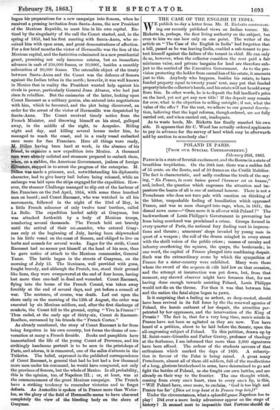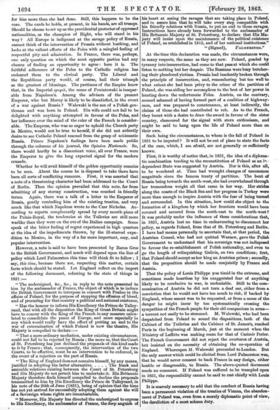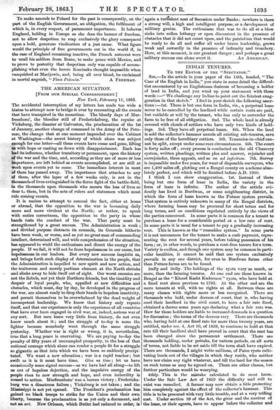POLAND IN PARTS.
[PROM OUR SPECIAL CORRESPONDENT.]
February 26th, 1863. PARIS is in a state of feverish excitement, and the Bourse in a state of breathless trepidation. On the 20th inst. there was a sudden fall of 55 cents. on the Rente, and of 50 francs on the Credit obilier. The fact is characteristic, and sadly confirms the truth of the say- ing, " En France, la rente baisse quand l'honneur est en hawse," and, indeed, the question which engrosses the attention and im- passions the hearts of all is one of national honour. There is not a Frenchman who does not turn pale with emotion on thinking of the bitter, unspeakable feeling of humiliation which oppressed France, and was so soon changed into rage, when, in 1831, the dismal news came—" Once more it is all over with Poland !" The backwardness of Louis Philippe's Government in preventing her from being murdered was proclaimed a crime. Groups formed in every quarter of Paris, the national fury finding vent in impreca- tions and threats ; armourers' shops invaded by young men in quest of a weapon ; the roll of the drums mingled in every street with the shrill voices of the public criers ; masses of cavalry and infantry overflowing the squares, the quays, the boulevards ; in one word, the capital of France plunged into maddening despair. Such was the extraordinary scene by which the sympathies of France for a sister-country were exhibited. Many were those whom the sword of the serpents de Mille laid low on that occasion, and the attempt at insurrection was put down, but, from that moment, any shrewd observer might have foreseen that, for not having done enough towards assisting Poland, Louis Philippe would not die on the throne. For then it was that between him and the nation the fatal abyss began to yawn.
Is it surprising that a feeling so ardent, so deep-rooted, should have been revived in its full force by the the renewed agonies of Poland, the heroic outburst of her despair, the atrocities per- petrated by her oppressors, and the intervention of the King of Prussia ? The fact is, that for a very long time, men's minds in France have not been so agitated as they are now. You have heard of a petition, about to be laid before the Senate, upon the all-engrossing subject of Poland. To this petition, drawn up by M. Saint-marc-Girardin and Father Gratry, professor of theology at the Sorbonne, I am informed that more than 2,000 signatures have been affixed. The ardour of the students savours of that enthusiasm which marked the days of 1830. A subscrip- tion in favour of the Poles is being raised. A great many Frenchmen, almost all of them old soldiers, full of the recollections of a long, glorious brotherhood in arms, have determined to go and fight the battles of Poland, as she fought our own battles, and are already on their way to the frontier. The one thought which, coming from every one's heart, rises to every one's lip, is this, "Will Poland have, once more, to exclaim, ' God is too high and France too far' (Dieu est trop haut et br France trop loin)?"
Under the circumstances, what a splendid game Napoleon has to play ! Did ever a more lucky adventurer appear on the stage of history? It seemed next to impossible that Fortune should do
for him more than she had done. Still, this happens to be the case. The cards he holds, at present, in his hands, are all trumps. Should he choose to set up as the providential protector of oppressed nationalities, as the champion of Right, who will stand in his way ? All Europe is indignant at the savage policy of Russia, cannot think of the intervention of Prussia without loathing, and looks at the valiant efforts of the Poles with a mingled feeling of respectful pity and admiration. In France, there was, perhaps, one only question on which the most opposite parties had any chance of finding an opportunity to agree : here it is. The faithful adherence of the Poles to the Catholic religion has endeared them to the clerical party. The Liberal and the Republican party would, of course, hail their triumph as the greatest of blessings. 'The partizans of the Empire know that, in the Imperial epopee, the name of Poniatowski is insepar- able from Napoleon's. Among the advisers of the present Emperor, who but Alorny is likely to be dissatisfied, in the event of a war against Russia ? Walewski is the son of a Polish gen- tleman and was born in Poland. His wife could not fail to be delighted with anything attempted in favour of the Poles, and her influence over the mind of the ruler of the French is consider- able. The Empress, who was so eager to uphold the Church party in Mexico, would not be true to herself, if she did not ardently desire to see Catholic Poland rescued from the grasp of schismatic Russia. Prince Napoleon's feelings have been made public through the columns of his journal, the Opinion Nationale. So, there would hardly be a dissentient voice, all over France, were the Emperor to give the long expected signal for the modern crusade.
Whether he will avail himself of the golden opportunity remains to be seen. About the course he is disposed to take there have been all sorts of conflicting rumours. First, it was asserted that a note of a threatening character had been addressed to the Court of Berlin. Then the opinion prevailed that this note, far from admitting of any stormy construction, was couched in friendly terms. Again, there was a talk of a letter to the Emperor of Russia, gently reminding him of the existing treaties, and very much like that which Napoleon wrote to the Czar Nicholas. Ac- cording to reports complacently spread by every mouth-piece of the Palais-Royal, the tendencies at the Tuileries are still more warlike than they were on the eve of the Italian campaign. Some speak of the bitter feeling of regret experienced in high quarters at the idea of the impediments thrown, by the ill-starred expe- dition to Mexico, in the way of a far more important, easy, and popular intervention.
However, a note is said to have been presented by Baron Gros to the British Government, and much will depend upon the line of policy which Lord Palmerston this time will think fit to follow ; I say, this time, because there are, respecting this matter, certain facts which should be stated. Let England reflect on the import of the following document, referring to the state of things in 1831 :- " The undersigned, &c., &c., in reply to the note presented to him by the ambassador of France, the object of which is to induce the British Government to interpose in concert with Frafice in the affairs of Poland, for the purpose of stopping the effusion of blood, and of procuring for that country a political and national existence, " Ilan the honour to inform His Excellency the Prince de Talley- rand, that with all the disposition the King of Great Britain might have to concur with the King of the French in any measure calcu- lated to consolidate the peace of Europe, and more especially ia any which would really have the effect of putting an end to the war of extermination of which Poland is now the theatre, His Majesty is compelled to declare :--- " That a mere ordinary mediation, under existing circumstances, could not fail to be rejected by Russia ; the more so, that the Court of St. Petersburg has just declined the proposals of ihis kind made to it by France ; that, consequently, the intervention of the two Courts, to he effective, must be an intervention to be enforced, in the event of a rejection on the part of Russia.
" The King of England does not conceive himself, by any means,
justified in adopting the latter alternative The frank and amicable relations existing between the Court of St. Petersburg and His Majesty do not permit him to undertake it. His Britannic Majesty therefore finds himself compelled to decline the proposals transmitted to him by His Excellency the Prince de Talleyrand, in his note of the 20th of June (1831), being of opinion that the time has not yet arrived for successfully adopting them against the will of a Sovereign whose rights are incontestable, " Moreover, His Majesty has directed the undersigned to express to His Excellency, the ambassador of France, the deep anguish of his heart at seeing the ravages that are taking place in Poland, and to assure him that he will take every step compatible with his friendly relations with Russia, to put an end to those ravages. Instructions have already been forwarded to the ambassador of His Britannic Majesty at St. Petersburg, to declare that His Ma- jesty will insist upon the maintenance of the political existence of Poland, as established in 1815, and of her national institutions."
" (Signed), PALS! ERSTON."
At the time this declaration was made, the circumstances were, in many respects, the same as they are now. Poland, goaded by tyranny into insurrection, had come to that pass at which she could listen to nothing but her despair. The Russians were busy butcher- ing their plundered victims. Prussia had insolently broken through the principle of insurrection, and, remembering but too well to what extent she had been privy to the crime of the partition of Poland, she was aiding her accomplices to the best of her power in hunting down the unfortunate Poles. Austria, on the contrary, seemed ashamed of having formed part of a coalition of highway- men, and was prepared to countenance, at least indirectly, the claims of those she had contributed to rob. As to the French, they burnt with a desire to draw the sword in favour of the sister country, clamoured for the signal with stern enthusiasm, and might be said to hang upon the life of Poland more than on their own.
Such being the circumstances, to whom is the fall of Poland in 1831 to be imputed ? It will not be out of place to state the facts of the case, which, I am afraid, are not generally or sufficiently known.
First, it is worthy of notice that, in 1831, the idea of a diploma- tic combination tending to the reconstitution of Poland as an in..- dependent State was suggested by Austria. Nor is this, after all, to be wondered at. Time had wrought changes of uncommon magnitude since the famous treaty of partition. The bent of Russia being towards the south-west, she had overwhelmed through
her tremendous weight all that came in her way. Her strides along the coasts of the Black Sea and her progress in Turkey were more than enough to inspire Austria with the fear of being turned and surrounded. In this situation, how could she object to the formation of a kingdom by which her frontiers would have been covered and secured from the south-east to the north-west? It was probably under the influence of these considerations that, in 1831, Austria lost no time in endeavouring to disconnect her policy, as regards Poland, from that of St. Petersburg and Berlin.
I have had means personally to ascertain that, at that period, the Austrian Consul, who had not quitted Warsaw, gave the Polish Government to understand that his sovereign was not indisposed
to favour the re-establishment of Polish nationality, and even to go the length of relinquishing Galicia, on two conditions; first,
that Poland should accept as her king an Austrian prince ; secondly, that the proposition should be made conjointly by France and Austria.
That the policy of Louis Philippe was timid in the extreme, and sometimes made heartless by his exaggerated fear of anything likely to be conducive to war, is undeniable. Still to the com- munication of Austria he did not turn a deaf ear, either from a conviction that he would not have too much to risk, if backed by England, whose assent was to be requested, or from a sense of the danger lie might incur by too systematically crossing the sympathies of the French people for their old companions in arms— a torrent not easily to be stemmed. M. Walewski, who had been despatched from Poland to sound the dispositions, both of the Cabinet of the Tuileries and the Cabinet of St. James's, reached Paris in the beginning of March, just at the moment when the Ministry of Laffitte was making room for that of Casimir Perier.
The French Government did not reject the overtures of Austria, but insisted on the necessity of obtaining the co-operation of England. Whereupon M. Walewski proceeded to London. But the only answer which could be elicited from Lord Palmerston was, that he would never consent to back France in any design, either hostile or disagreeable, to Russia. The above-quoted document needs no comment. If Poland was suffered to be trampled upon in 1831, the responsibility cannot be said to rest chiefly with Louis Philippe.
It is scarcely necessary to add that the conduct of Russia having been a permanent violation of the treaties of Vienna, the abandon- ment of Poland was, even from a merely diplomatic point of view, the dereliction of a most solemn duty.
To make amends to Poland for the past is consequently, on the part of the English Government, an obligation, the fulfilment of which is, in every respect, of paramount importance. It behoves England, holding in Europe as she does the banner of freedom, not to allow despotism to reap exclusively the glory consequent upon a bold, generous vindication of a just cause. What figure would the principle of free governments cut in the world if, in the case of England remaining inactive, the French autocrat were to recall his soldiers from Rome, to make peace with Mexico, and to prove to posterity that despotism only was capable of accom- plishing what even the heroic Kosciusko thought impossible when vanquished at Macijowic, and, being all over blood, he exclaimed
in mortal anguish, "Finis Polouiw." A FREEMAN.
































 Previous page
Previous page